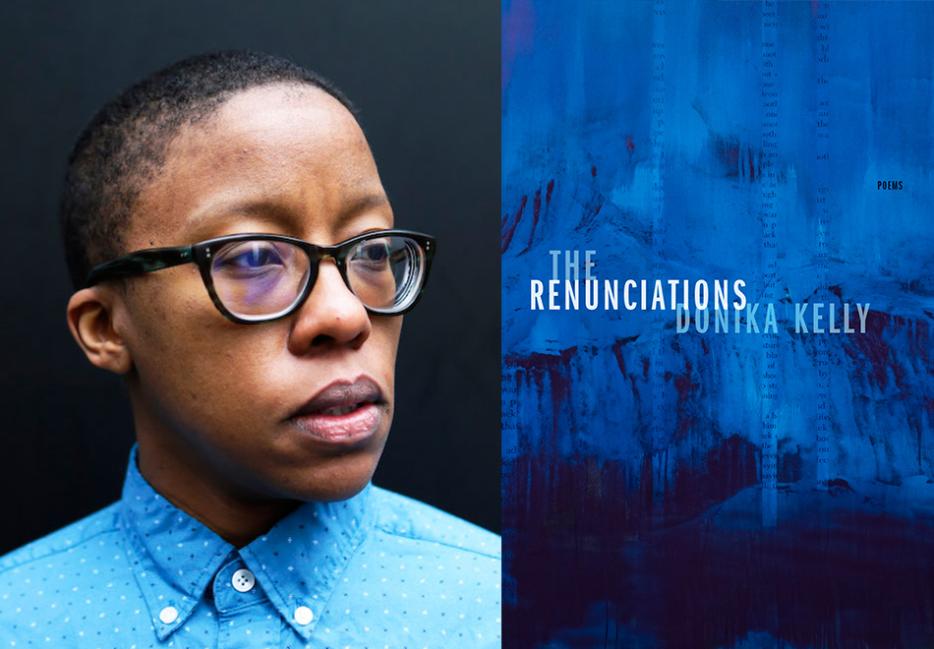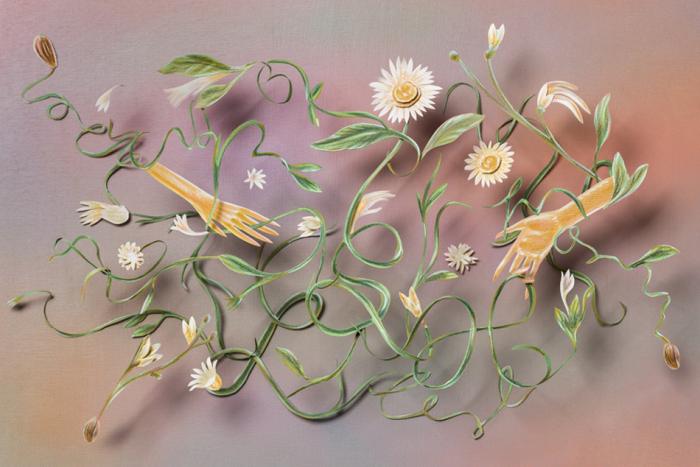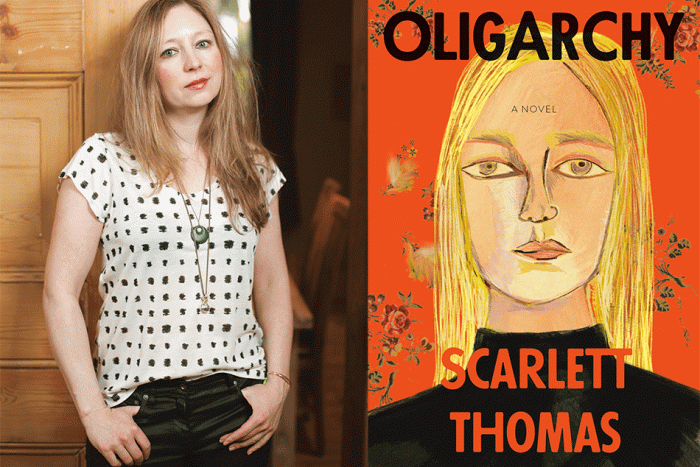The Renunciations (Graywolf Press), poet and Iowa Writer’s Workshop professor Donika Kelly’s sophomore collection, opens with an explosion. In a nod to astrology, even the poem’s title, House of Air, Hours of Fire, evokes a blinding brightness that reduces to ash. And reading this collection is in many ways a flammable experience: the language simply glows, even when it appears as erasure or empty brackets. The content circles childhood sexual abuse, divorce, and glimmers of hope and home, the possibility of rootedness. Along with fire, other elements come into play: water, earth, air. Sediment that gets disrupted, shoots of new growth, foundations maybe, slowly, being built.
Kelly’s almost otherworldly gift for composing words into something alive was clear in her 2016 debut, Bestiary; The Renunciations too embodies the animal, which is also the human. In “Hymn,” she writes:
“...the closer I am/to my animal self the more human I am/the more I let myself break/like a wave. Ocean/in my arm. Stone in my arm./Iron and wood and brass in my arm.”
And in one of the several poems titled “Dear–,”:
“I hold my breath. My body hollows,/grows teeth: gathers bone, gathers root and nerve.”
The visceral nature of this collection carries the reader to heights of poetic euphoria while simultaneously refusing to look away from pain. “I am neither land nor timber,” she writes, “nor are you/ocean or celestial body. Rather,/we are the small animals we’ve always been.”
I spoke to Kelly on Zoom about myths and mythology, artifice, hope, and what it means to be a non-believer.
Sarah Neilson: The epigraph of this book is from Anne Carson: “To live past the end of your myth is a perilous thing.” What is the myth you've lived past, if you have one? Are there any myths that are meaningful in your life? And how do they serve you or not serve you?
Donika Kelly: The core myth that I would say I've lived past… Well, there are two. The one where my dad sort of occupies the center of the family. And a big part of [living past] that was teaching gender studies—just realizing I could put myself at the center of my life. A man doesn't have to be at the center of my life. And the other myth, which comes out of that, has to do with the formation of romantic relationships as I saw modeled in my family of origin: My parents are definitely a stay-together-forever, it-doesn't-matter-how-bad-it-is, this-is-better-than-anything-else model. That's not a great model. It was not a great model when I was a kid, I recognized that. But that was a hard one to let go—that being married, being partnered, meant that that person was also at the center and that I wasn't at the center of my own life. So those myths, if that's a way of thinking about them, those myths served to keep my attention on other people and what other people needed. And I think this book demonstrates the process of, how do I move those folks from the center? How do I move those ideas from the center? And how do I get closer to the center of my own life? I'm hoping that I'm not living with too many myths right now.
Carl Phillips has this craft essay on the uses of myth and fable. And he says that—I'm paraphrasing, so, grain of salt—but the way I remember it is that a myth helps us explain something we don't understand. And I think I've come to understand some things now. I don't need the myth anymore.
The first poem in the collection, House of Air, Hours of Fire, is such a powerful gut-punch of a poem. What made you decide to open the book that way?
That poem is the clearest overture that I've written. It captures the two strands of the book: the removal of the father from the center of the speaker's life, and then the ending of the marriage. The title refers to the fact that my dad is an Aquarius, which is an air sign. My ex is a Leo, and I'm a Sagittarius [fire signs]. I don't necessarily believe in astrology, but it created one small lens for understanding, a kind of elemental interaction. The Aquarius is the water bearer, and so I started with that—what does my dad have to bear? What does this father have to bear? And then what does the speaker, the daughter, what does she have to bear? The poem also brings in a lot of the themes around landscape and time that feels like it foreshadows what's to come in the book, and it was one that I wrote towards the end of writing the poems that would go into the book.
In an interview with The Creative Independent, you said: “...it’s not just like, ‘Here’s this trauma without the artifice.’ The artifice is nice. The artifice is like a little pillow around the trauma, and a reminder that I’m okay and my speaker is okay, and hopefully the reader feels safer in that space.” I think sometimes the word “artifice” has a negative connotation. Can you expand on the idea of finding safety and comfort in artifice?
Artifice doesn't have a negative connotation to me, and I don't know how it could, since I'm a poet; so much of the genre relies on artifice. Like, Oh, here are some stanzas. Here's a rhyme. Which would not occur naturally, right? Here's a soundscape that's holding the poem together in some way. The artifice for me is actually really comforting. It's one of the things that I love about poetry—that there are ways to present material and process emotional material to make it available, or translate it for readers. That being said, the artifice for me as the writer is a way of processing the feeling, the thought, the act. The experience, the events. It suggests a measure of distance or control in relation to the material.
As a person who has written about sexual violence and trauma, I often am read as “raw.” But I would not ever give anyone the raw experience. That would feel irresponsible to me. But I think what that means is it creates a feeling inside the reader of encountering something that is intense. There's a measure of intensity. And it was important for me to feel that I was exercising some control over the experience, over the work—that there was a reason that I was bringing myself to that event and remembering it, and a reason I'm asking the reader to come along with me to remember. For me, the artifice is the suggestion that there is a structure here, that design and thought has gone into this, that I've made something for someone.
How do you take care of yourself when you're writing about trauma?
I have some very basic strategies. So, when I decided… it didn't really feel like a decision, but when I felt compelled to write about childhood sexual abuse and the abuse that I experienced, I knew that I was going to need some help. I've been in therapy since I was 17 or 18, almost consistently. Therapy is a big tool that I use to help manage and navigate some of that traumatic stuff. So when I'm writing, if it feels too hard, I can take that to therapy and work out what's hard, what feels scary, why I feel compelled to write about this. So there's that aspect of it; therapy is super helpful. But when I'm actually writing and I've decided this is what I'm doing, writing about this traumatic stuff, I can get really anxious and scared. Part of my strategy is to remind myself that I'm safe, which has been true. For the last 10 years or so I’ve felt really safe. The other thing that I do is remind myself I can stop at any time, that I don't have to do it. No one's asking for the poems. It's not like someone's like, "We need your poems about trauma." It's not for anyone, and I think that has been really important to recognize—that the work that I'm doing, and writing the poems, is first for me. So if I am not being served by the process, I can stop. I've gotten pretty good at just checking in and attending to all the little parts that can get worked up.
I am so drawn to your use of empty brackets and erasure, conveying this sense of missing, or stolen, or hidden information. Can you talk about the role of these tools in the book, what they mean to you?
This is the reduction in erasure. Each section is headed by a redacted letter, and those letters are drawn from real letters that I wrote in a therapeutic practice, like writing a letter to somebody that you don’t send but you can say whatever you want in it. I did that, and it was helpful when I did it. But it was to someone; even though I wasn't ever going to share it, it was to that person. I got the idea in a workshop with Gabby Calvocoressi. They asked us to do either erasure or redaction as part of an exercise, and I was like, "Oh, I have these letters." I was drawn to those letters because I believe I thought—not consciously, not in the foreground of my brain, but somewhere deep—I thought, "I wrote something to myself in here. It wasn't really to this person. This is for me." And so the redactions in terms of what they do for me, and what they did for me in the process of writing them, it was a way of trying to find these messages to myself.
This goes back to what we were talking about with artifice. They are a reminder to the reader that the reader does not have access to everything, even though the collection is very forthcoming, very plain-spoken, I think. I hope. It feels intimate, but there are things that people don't know and won't know who do not share that experience. The brackets do something similar, the sort of erased parts and withholding. But what they do for me is that I've taken out some things that I don't ever want to say. I don't want to have to complete the sentence. I don't want to have to save the thing that I'm recounting, that I'm remembering. Thinking about other strategies for taking care of myself and writing about trauma, that particular technique is perhaps one of the more protective ones. I don't ever have to say that thing out loud, and so I'm taking care of myself. My speaker doesn't have to say it out loud, so it's also a kindness to the speaker. I feel like it's an act of tenderness of care. It's like, "We don't have to say that." It's not necessary to say everything; we can say what feels possible to say right now.
I’m curious about the structure of the collection and your thoughts about where you were positioning the different poems, and the different emotional tones of the poems, in relation to each other in the book.
I feel so pleased with the structure, and in some ways the process of it coming [together] in terms of it existing in its final form. When I initially put the manuscript together, the sections alternated in the ways that they do now: the sections about the end of the marriage alternate with the sections about the father—the sections about the end of the marriage are moving forward in time, is how I think of it. It's like we're coming to the end. It's like a series of oh-no’s; I have to figure out how to be by myself.
I think the first section is about, who is this person? Of course they're scared. I know that there's a way to flatten out abusers, people who are abusive, [by making them monsters]. And that's not interesting. So I thought I might do a little bit of internal investigation about how I understood my dad's life and his existence before he was my dad, like as a whole human being. But I don't know that much about him; as it turns out, I know very little. So putting the poems together in that first section is really like trying to understand something about the father as a person who had experiences. Then it sort of moves forward into the abuse.
It felt important to me to not start with the father or begin with the abuse. That actually felt really important to me. But it felt like I needed to articulate my own progression towards being able to talk about and acknowledge what happened. And that's replicated in the book. Jeff Shotts, my editor, was like, "Can we have some page breaks, some section breaks?" And I was like, "No. Absolutely not." He was like, "Numbered sections." I was like, "Unthinkable. I couldn't possibly." But I listened to Jeff. I might not always agree with his direct suggestions, but I do trust his instincts. I think he really was asking for room to give the reader some kind of respite, like some little pitstops through the experiences. There's room to breathe in the book and the way that it exists now. Before it was like a waterfall, and now I think there are these steps between them that feel careful and caring, too. This is important to me, to the speaker. The speaker doesn't have to rush through all of that, and also the reader doesn't have to rush through all of it.
We came back to air.
Yes.
I'm really interested in the way that you explore the tension between science and faith. It’s not a binary tension, but there’s a line from In the Chapel of St. Mary’s that reads, “I try to find comfort in the inevitability/of science, when what I lack is faith.” In Sanctuary, you write, “I call this the difficulty of the nonbeliever,/of waking, every morning, without a god.” Can you talk about exploring that faith and prayer aspect, and the word “non-believer” in your work?
Greek mythology relies on gods in a particular kind of way. They're very fallible. I stopped believing, or maybe I never really believed in God, when I was in my twenties. And that was really disorienting because it felt wrong. But the Greek mythology still made sense, and part of what I was trying to work through in this book was like, "Why am I still relying on Greek mythology when I don't believe in anything?" I don't have a prayer practice. I don't have meditative practices. The primary practice in my life is writing and writing poetry. But I don't necessarily believe that I am right. There are so many things that I don't understand. I think that in some ways, the book is working through that. What does it mean to have faith? What does it mean to trust that things will be okay? What does that mean to move through the world without a sense of something larger at the wheel? And where I've come to is, strangely, I believe in time. I believe in the experiences that I've had. I believe in trusting my instincts based on my experiences. I believe in relating to people based on the experiences that we have had together. That has been the thing that has made the most sense. And the writing of poems takes a certain kind of time. That time feels long and stretchy, even though it tends not to be on-the-clock long. There's just something about time that feels really comforting. So my sort of new interest, my new direction, I am thinking about time, also geologic time. Because it's so big, and we're so little.
At the end of the book, with The moon rose over the bay. I had a lot of feelings., you so beautifully reclaim the land use imagery you started with, and turn it into building something rather than taking something. Can you talk about the process of arriving at that last poem? Was it actually the last poem you wrote for the book?
I just thought that last poem feels appropriately hopeful, which is to say not very but a little bit. Like something could potentially happen that is positive. I wrote that poem, again, in a workshop with Gabby. Same workshop. It was a very productive time in Provincetown. And I wrote that before I wrote [the opening poem] House of Air, Hours of Fire, like a full year before. The thing I like about the last poem—aside from its tempered hopefulness which I do really like—it's very tempered, and that's reassuring to me. The speaker in that poem is trying to figure out what the future could look like and hasn't started to make anything. But it's like trying to imagine what the future could look like. Like to stand in a mud field and call it a pasture. I don't really know what a pasture is, and the speaker doesn't either. But it's like, "Okay, so I could make something here. Maybe a life." It feels in contrast with the beginning where that speaker's feature seemed more foreclosed. Here at the end, it does feel like a bit of an opening. And I've often struggled to think about the future. So I count The moon rose over the bay. I had a lot of feelings. as little gestures of hopefulness and possibility.






